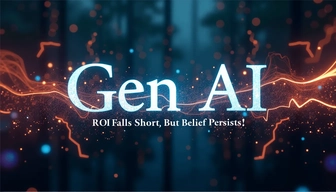Gen AI ROI Falls Short, But Belief Persists

A recent survey by Deloitte indicates that while the returns on generative AI (gen AI) are not materializing as swiftly as expected, there remains a sustained interest and excitement within the enterprise community regarding its potential benefits. This insight emerged from the fourth quarterly edition of the Deloitte AI Institute’s State of Generative AI in the Enterprise report, which highlights ongoing challenges alongside optimism in the field.
Challenges in Realizing ROI
According to Jim Rowan, applied AI leader at Deloitte Consulting, organizations are increasingly focusing on pragmatic solutions. The survey revealed that among 2,773 global leaders familiar with AI implementation, the tension between innovation and necessary regulation has slowed progress on gen AI projects significantly. While 78% of these executives plan to increase their AI spending in the upcoming fiscal year, over two-thirds expect that only 30% or fewer of their gen AI experiments will achieve full-scale deployment within the next three to six months. This indicates a reluctance to adopt full-scale solutions when the return on investment continues to lag.
Regulatory Compliance as a Barrier
The survey also pointed out increasing concerns about regulatory compliance, which has emerged as a critical obstacle to the development of gen AI tools. Concerns regarding compliance have risen from 28% earlier in the year to 38%, illustrating how regulatory hurdles are weighing heavily on organizations as they seek to scale gen AI initiatives. Furthermore, 69% of executives indicated that implementing a robust governance strategy for their gen AI endeavors could take over a year to actualize, pointing to an extended timeline for potential benefits.
Shifts in Strategic Focus and ROI Realization
Despite the slow progress, many organizations are pivoting their strategies towards achieving competitive differentiation through gen AI, influenced by the initial positive results from their deployments. Notably, a substantial portion of respondents reported measurable ROI from their general AI projects, with 20% claiming an ROI of over 31%. This reveals that while the pathway may be fraught with challenges, there are indeed tangible benefits that can and are being realized.
The Rise of Agentic AI
A noteworthy development in the latter part of 2024 is the rise of agentic AI, which previously did not feature in Deloitte’s surveys but is now becoming a focal point. By Q4, 26% of surveyed leaders reported exploring autonomous agent development extensively, demonstrating a shift in interest towards autonomous solutions.
IT Department Leading the Way
Currently, the IT function appears to be capitalizing the most effectively on gen AI capabilities, with 28% of respondents indicating that their most advanced gen AI initiatives are within IT. This success can be attributed to the IT teams’ motivation to embrace technology, enhanced time efficiency from AI code generation, and the overall automation of critical processes. Such initiatives not only bolster skill development within IT but also support more experienced handling of the tools, positioning CIOs as strategic change agents within their organizations.
The Role of CIOs in Scaling Gen AI
Rowan emphasizes the crucial role of Chief Information Officers (CIOs) in fostering trust towards generative AI technologies. This relationship extends to building coordinated strategies with HR to cultivate organizational confidence in the technology. Furthermore, CIOs must proficiently manage the costs associated with scaling gen AI while identifying the right models and solutions to address business challenges effectively.
Expectation Management Among C-suite Executives
Finally, the survey revealed a disparity in perception regarding the barriers to scaling efforts between C-suite executives and their peers. While enthusiasm for gen AI remains high among all levels of leadership, C-suite executives reported a more pronounced belief in the transformative impact of gen AI within their organizations. However, many non-C-suite respondents anticipate that overcoming scaling barriers will take at least a year, necessitating careful expectation management from CIOs and their teams.
These insights collectively highlight that although the realization of ROI from generative AI is taking longer than anticipated, the overall sentiment within the enterprise sector remains optimistic. For CIOs, the focus should be on navigating the complexities of scaling up generative AI while cultivating a culture of trust and compliance within their organizations.